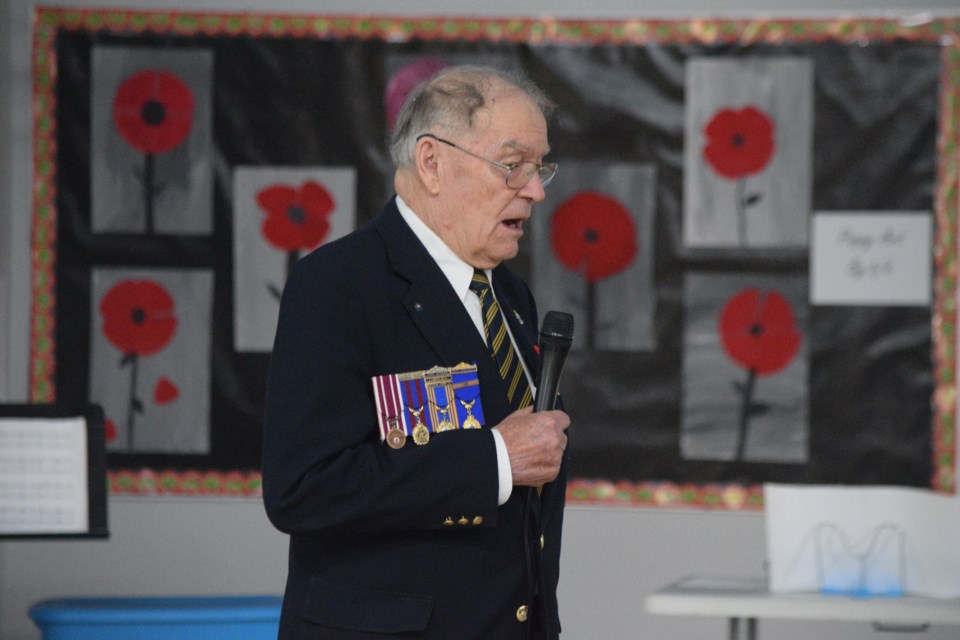BARRHEAD - A former Canadian Armed Forces (CAF) veteran believes more young people should consider serving their country as part of the military.
That is what Chuck Mortimer, Barrhead Royal Canadian Legion president, told Dunstable School students during their Nov. 2 Remembrance ceremony.
In addition to being a long-serving Legion member, Mortimer served 15 years in the CAF reserves.
The reserves are part of the Royal Canadian Armoured Corps, which was formed in 1910 as an infantry unit but, over the years, has served many roles, including as a tank, machine gun and currently as a reconnaissance unit.
He first joined what was then called the militia in 1949, serving as part of the King's Own Calgary Regiment.
Mortimer said service to one's country, as part of the military, was something he learned from his father.
He added that his father came to Canada as an immigrant early in the last century as a teenager.
"He homesteaded, having a quarter of land just over the Saskatchewan border," he said.
However, the First World War began shortly after his father arrived.
Mortimer said although Canada declared war against Germany almost immediately, on Aug. 4, 1914, a day after Britain, it took nearly a year to contribute troops under its flag as they did not have an army.
"Dad joined in 2016, training in Canada, before being deployed to England for more training," he said, adding he would have joined sooner but was not old enough.
However, before Mortimer's father could see any action, he contracted the Spanish Flu, which was raging across Europe, and was sent to the hospital.
"By the time he was released, the war was over, and he was shipped back to Canada," Mortimer said, adding the fact that he had not been able to serve bothered his father immensely.
When his father returned home, he resumed his life as a farmer, married, and started a family.
But then came the Dirty Thirties, a period of drought that decimated most crops in Western Canada, and the Depression.
"People left most areas of [the prairies] for other areas of Canada because there was nothing left for them," he said.
But his family stayed, Mortimer said, saying their farm did better than most as it was in northern Alberta in a rain belt.
Then, the Second World War came.
Mortimer said even though his father had the responsibilities of a farm and family, he attempted to re-enlist immediately, first going to a recruiting office in Saskatoon and then Edmonton.
They both told him he was too old. He was 45.
But one avenue remained for Mortimer's father to explore: the Veterans Guards of Canada.
Existing from 1940 to 1947, the Veterans Guards of Canada was initially established as a defence force in the case of a German or Japanese attack on Canadian soil. Organized into numbered companies of approximately 250 men, the Veterans Guard included both Active and Reserve companies. At its peak, in June 1943, the force numbered close to 10,000, many of whom, like Mortimer's father, were First World War veterans considered too old.
In addition to serving as a defence force and guarding military installations, the Veterans Guard also assumed the responsibility of guarding Canadian internment or prisoner of war (POW) camps, taking over from the Canadian Provost Corps, the Veterans Guard helped free up younger Canadians for overseas service.
And that is what Mortimer's father did, serving at different posts, including a camp outside of Medicine Hat.
"My father told me stories about the German prisoners. Most of them would work on area farms," he said.
One particular story stood out: the prisoner who told the farm owner he was assigned to that he wanted to buy it.
Of course, as a POW, he did not have the money to do so, but after the war ended, he returned home to Germany, sold his assets, and bought the farm just south of Brooks.
At the time, Mortimer was with the Brooks Legion and came to an event they held.
That is how he got to know the man, who was a well-known and respected community leader.
"My father felt it was important to serve his country, and so did the German prisoners," Mortimer said. "They were not Nazis or enemies of Canada. They were working for their government, captured and brought here. Many of those German prisoners are now Canadian citizens."
Barry Kerton, TownandCountryToday.com



